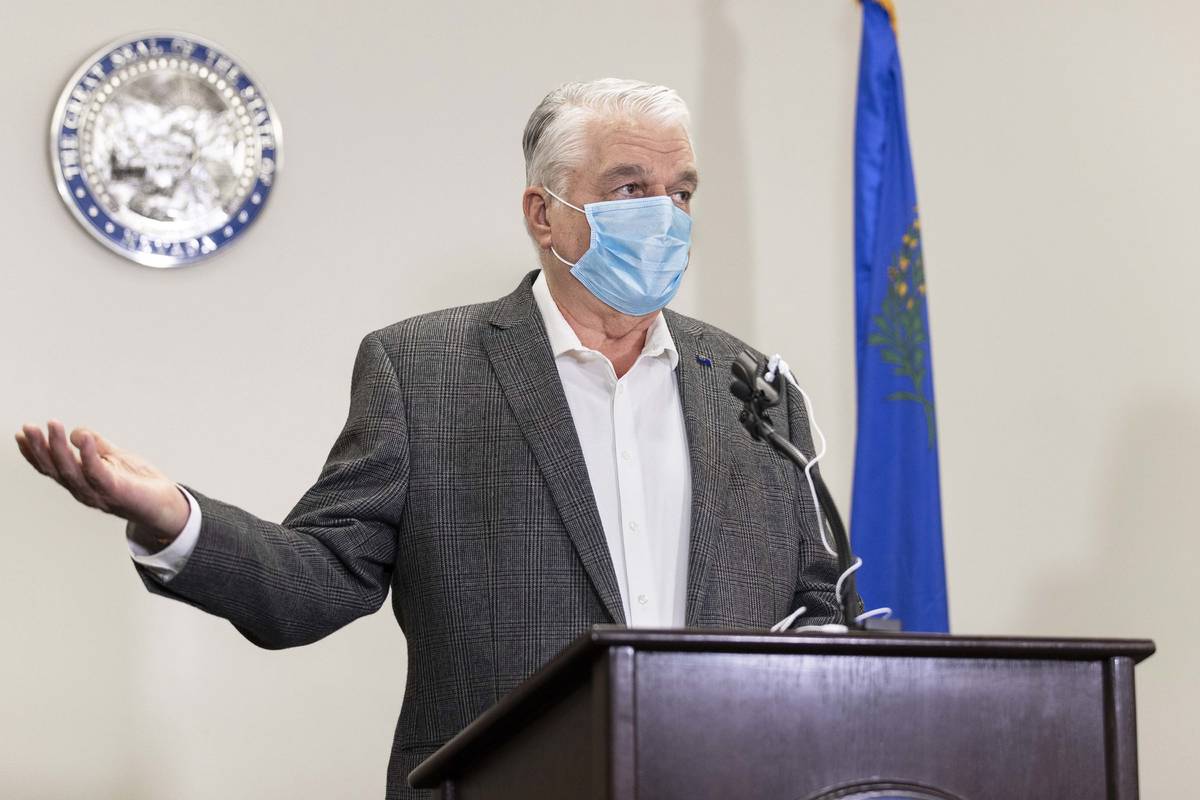Sisolak acts to fight vaccine ‘equity crisis’ in Clark County

Citing alarming vaccination data in Southern Nevada, Gov. Steve Sisolak announced new efforts to distribute doses more equitably across racial and ethnic groups.
“Clark County is facing an equity crisis. It must stop,” Sisolak said in a pre-recorded video address Friday morning announcing his Equity and Fairness Initiative. “There is a disparity in who is receiving the vaccine that does not reflect the demographics of that region.”
State officials will work with Southern Nevada Health District and Clark County “to clarify prioritization lanes, support fair access to vaccines through site selection, and equitable allocation across communities,” according to the governor. Nevada’s immunization team is also creating an equity task force in conjunction with the Nevada Minority Health & Equity Coalition, Sisolak’s chief of staff Michelle White announced this week.
The governor underscored his decision with vaccination data published weekly by the Southern Nevada Health District.
Excluding people whose race is reportedly unknown, only about 6 percent of vaccine recipients in Clark County were Black, despite that racial group making up 12 percent of the county’s population. Hispanics received about 13.5 percent of the doses, but they make up close to 32 percent of the population.
White and Asian people had received a larger share of vaccines than their share of the county population, the data shows.
Hard-hit ZIP codes lag
Sisolak said residency data on vaccine recipients showed that the county’s ZIP codes that were hardest hit by COVID-19 had the lowest frequency of vaccinations.
“These ZIP codes represent Clark County’s working class families, lower-income households and communities of color,” Sisolak said.
Instead, the largest number of doses have gone to residents of mostly white, suburban ZIP codes, according to an internal government report dated Feb. 1 and obtained by the Review-Journal.
The most doses, more than 6,100, had been administered to Henderson residents in the 89052 ZIP code, which covers the communities of Seven Hills and MacDonald Ranch. Residents of another area of the city, Green Valley Ranch, had the second most doses administered, about 4,800. Other areas with large numbers of doses administered include multiple ZIP codes in Summerlin.
Only one of the top 10 ZIP codes had a majority-minority population, meaning less than 50 percent of residents are non-Hispanic whites.
The neighborhood with the Las Vegas Valley’s highest COVID-19 infection rate — the heavily Latino ZIP code of 89110 in east Las Vegas — had seen less than 2,400 shots.
The data did not delineate between the general public and essential workers. It measured the total shots administered to residents, meaning a person who had received both doses would be counted twice.
The Review-Journal has sought statewide ZIP code residency data and racial data for vaccine recipients for weeks, but the news organization’s requests have been met with delays by state health officials.
A reporter first requested the data for vaccine recipients from the Department of Health and Human Services on Jan. 25. Department spokeswoman Martha Framsted responded that it would take at least two months to compile the information.
During a press briefing Friday, department officials defended the delay, saying the data needed further review before being released. They would not commit to providing the residency data to the public on a regular basis, despite Sisolak citing it as one of the driving forces behind his equity initiative.
“Public health data is not something that we’re used to releasing in real time. … we don’t have time to truly clean and validate all the data,” DHHS deputy administrator Julia Peek said. “If we share data out of context, then it can present the picture to our public that’s not accurate.”
Equity efforts started
In the past two weeks, the SNHD and local governments have begun opening pop-up vaccination sites in communities of color with the goal of increasing immunizations there. However, many of the sites have allowed any eligible Nevadan to sign up, regardless of where they live.
SNHD health officer Dr. Fermin Leguen on Wednesday said the county would soon change its strategy. He described deploying vaccination strike teams to inoculate people living in hard-hit areas.
“We cannot rely on just a mass vaccination site being located in that area, because it doesn’t guarantee that people in the heavily affected area will get vaccinated there,” he said.
Culinary Local 226 secretary-treasurer Geoconda Argüello-Kline published a statement applauding Sisolak’s new intiative.
“Communities of color, who have highest incidents of COVID-19 infection rates and deaths due to the virus, need equitable access to the vaccine. That includes the 60,000 frontline unionized hospitality workers who work in casinos and throughout the resort industry in Nevada,” she said in the release.
The release also stated more than 100 union members and their immediate family members have died from COVID-19. Some 1,200 have been hospitalized.
In his video, Sisolak also took aim at “rumors and substantiated examples” of people getting access to the vaccine who were not yet eligible. Currently, Clark County is vaccinating certain groups of essential workers and members of the public aged 70 and older. However, any worker from an eligible group who works from home is not supposed to receive the vaccine.
“The blame rests solely on the shoulders of those in leadership positions. They know better,” Sisolak said. “Every time a group that is not eligible is being vaccinated, those doses are being taken away from someone’s grandma or grandpa or a front-line worker who has been showing up every day throughout the pandemic.”
The governor did not name of any of the leaders or institutions with which he found fault.
Clark County Commission chairwoman Marilyn Kirkpatrick did not respond to multiple requests for comment Friday.
Nevada climbs out of bottom in administering vaccine, CDC says
Large Las Vegas venues eyed for vaccination sites
Contact Michael Scott Davidson at sdavidson@reviewjournal.com or 702-477-3861. Follow @davidsonlvrj on Twitter.
Review-Journal staff writers Colton Lochhead and Shea Johnson contributed to this report.